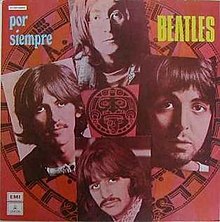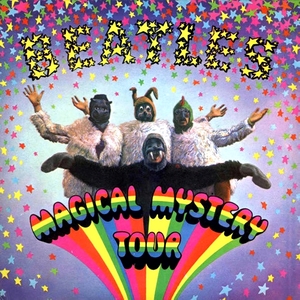
Magical Mystery Tour is a record by the English rock band the Beatles that was released as a double EP in the United Kingdom and an LP in the United States. It includes the soundtrack to the 1967 television film of the same name. The EP was issued in the UK on 8 December 1967 on the Parlophone label, while the Capitol Records LP release in the US and Canada occurred on 27 November and features an additional five songs that were originally released as singles that year. In 1976, Parlophone released the eleven-track LP in the UK.

"Strawberry Fields Forever" is a song by the English rock band the Beatles, written by John Lennon and credited to Lennon–McCartney. It was released on 13 February 1967 as a double A-side single with "Penny Lane". It represented a departure from the group's previous singles and a novel listening experience for the contemporary pop audience. While the song initially divided and confused music critics and the group's fans, it proved highly influential on the emerging psychedelic genre. Its accompanying promotional film is similarly recognised as a pioneering work in the medium of music video.

A Collection of Beatles Oldies is a compilation album by the English rock band the Beatles. Released in the United Kingdom in December 1966, it features hit singles and other songs issued by the group between 1963 and 1966. The compilation served as a stopgap release to satisfy EMI's demand for product during the Christmas period, since the Beatles had only begun recording Sgt. Pepper's Lonely Hearts Club Band, the follow-up to their Revolver album, late the previous month. It was the band's first official greatest hits collection, although the Beatles had no involvement in the album.
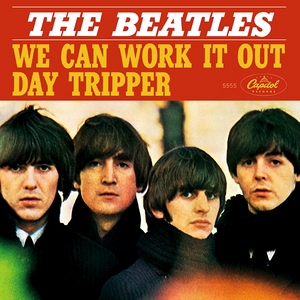
"We Can Work It Out" is a song by the English rock band the Beatles, written by Paul McCartney and John Lennon. It was first issued as a double A-side single with "Day Tripper" in December 1965. The song was recorded during the sessions for the band's Rubber Soul album. The single reached number one in Britain, the United States, Australia, Canada and Ireland. In the UK, it was the seventh highest selling single of the 1960s.

"Paperback Writer" is a song by the English rock band the Beatles. Written primarily by Paul McCartney and credited to the Lennon–McCartney partnership, the song was released as the A-side of their eleventh single in May 1966. It topped singles charts in the United Kingdom, the United States, Ireland, West Germany, Australia, New Zealand and Norway. On the US Billboard Hot 100, the song was at number one for two non-consecutive weeks, being interrupted by Frank Sinatra's "Strangers in the Night".

The Beatles' Story is the sixth album by the English rock band the Beatles in the United States, issued on 23 November 1964 by Capitol Records. It is a documentary double album featuring interviews, press conferences, and snippets of original or orchestral versions of Beatles songs, with voice-over narration. The album's original liner notes described it as a "narrative and musical biography" of Beatlemania. It was produced by Los Angeles–based songwriter and producer Gary Usher and disc jockey and lyricist Roger Christian, and narrated by John Babcock, Al Wiman and Christian.

"Day Tripper" is a song by the English rock band the Beatles that was released as a double A-side single with "We Can Work It Out" in December 1965. The song was written primarily by John Lennon with some contributions from Paul McCartney and was credited to the Lennon–McCartney partnership. Both songs were recorded during the sessions for the band's Rubber Soul album. The single topped charts in Britain, Ireland, the Netherlands and Norway. In the United States, "Day Tripper" peaked at number five on the Billboard Hot 100 chart and "We Can Work It Out" held the top position.

Blast from Your Past is a compilation album by English rock musician Ringo Starr, released on Apple Records in 1975. It is both Starr's first compilation LP and his final release under his contract with EMI. It was also the last album to be released on the Beatles' Apple label until it was revived in the 1990s.
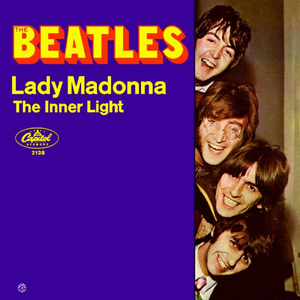
"Lady Madonna" is a song by the English rock band the Beatles, written primarily by Paul McCartney and credited to Lennon–McCartney. In March 1968, it was released as a mono single, backed with "The Inner Light". The song was recorded on 3 and 6 February 1968 before the Beatles left for India, and its boogie-woogie style signalled a more conventional approach to writing and recording for the group following the psychedelic experimentation of the previous two years.

"The Fool on the Hill" is a song by the English rock band the Beatles from their 1967 EP and album Magical Mystery Tour. It was written and sung by Paul McCartney and credited to the Lennon–McCartney partnership. The lyrics describe the titular "fool", a solitary figure who is not understood by others, but is actually wise. McCartney said the idea for the song was inspired by the Dutch design collective the Fool, who derived their name from the tarot card of the same name, and possibly by Maharishi Mahesh Yogi.
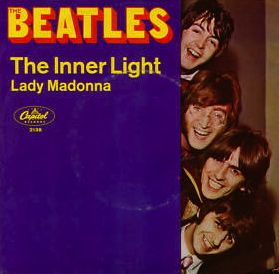
"The Inner Light" is a song by the English rock band the Beatles, written by George Harrison. It was released on a non-album single in March 1968, as the B-side to "Lady Madonna". The song was the first Harrison composition to be issued on a Beatles single and reflects the band's embrace of Transcendental Meditation, which they were studying in India under Maharishi Mahesh Yogi at the time of the single's release. After "Love You To" and "Within You Without You", it was the last of Harrison's three songs from the Beatles era that demonstrate an overt Indian classical influence and are styled as Indian pieces. The lyrics are a rendering of a poem from the Taoist Tao Te Ching, which he set to music on the recommendation of Juan Mascaró, a Sanskrit scholar who had translated the passage in his 1958 book Lamps of Fire.
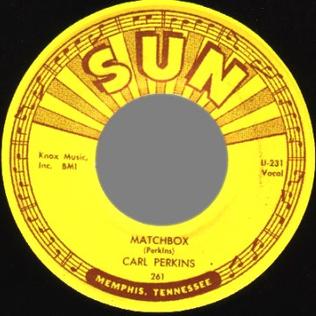
"Matchbox" is a song written and recorded by Carl Perkins and released in 1957. Blind Lemon Jefferson wrote and recorded a song entitled "Match Box Blues" in 1927, which is musically different but which contains some lyric phrases in common.

The Best of George Harrison is a 1976 compilation album by English musician George Harrison, released following the expiration of his EMI-affiliated Apple Records contract. Uniquely among all of the four Beatles' solo releases, apart from posthumous compilations, it mixes a selection of the artist's songs recorded with the Beatles on one side, and later hits recorded under his own name on the other.
Nicholas Schaffner was an American non-fiction author, journalist, and singer-songwriter.
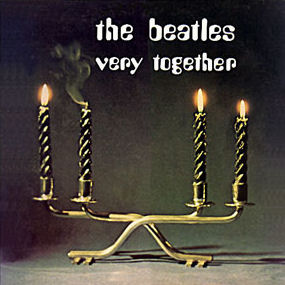
Very Together is an album by the English rock band the Beatles and the first compilation of the band's early recordings supporting Tony Sheridan to be released in Canada. It was issued in November 1969 by Polydor Records, with the catalogue number 242.008. The cover photograph features four candles, one of which has been extinguished – a reference to the "Paul is dead" urban legend.

The Beatles Box is an eight-record box set of Beatles recordings, initially released on 3 November 1980 by World Records, a mail-order subsidiary of EMI. It was also issued in two formats by Reader's Digest in New Zealand, Australia and Mexico.
The Beatles' 1965 tour of the United Kingdom was a concert tour that took place between 3 and 12 December 1965, comprising 18 shows at nine venues across England, Scotland and Wales. It coincided with the release of the Beatles' studio album Rubber Soul and their double A-side single "Day Tripper" / "We Can Work It Out", and was the final UK tour undertaken by the band. Weary of Beatlemania, the group conceded to do the tour but refused to also perform a season of Christmas concerts as they had done over the 1963–64 and 1964–65 Christmas seasons.

The Beatles EP Collection is a box set of vinyl records by the English rock band the Beatles. It was released by EMI's Parlophone record label in the United Kingdom on 7 December 1981. The box set consists of thirteen of the band's extended play (EP) releases from 1963 to 1967, including the double EP Magical Mystery Tour, and a new disc, titled The Beatles, which compiled previously unavailable stereo mixes of four songs. Released with the Parlophone catalogue number BEP 14, the box set was the third in a series of format-based sets in the UK, after The Singles Collection 1962–1970 (1976) and The Beatles Collection (1978).

The Singles Collection 1962–1970 is a series of reissued singles by the English rock band the Beatles. It was released in Britain on 5 March 1976 by EMI, following the expiration of the Beatles' contract with the company in January, and close to six years after the band's break-up. The collection comprises all 22 of the Beatles' UK singles, which were originally issued between October 1962 and March 1970 on either the Parlophone or Apple record labels, together with a new single pairing "Yesterday" with "I Should Have Known Better".
